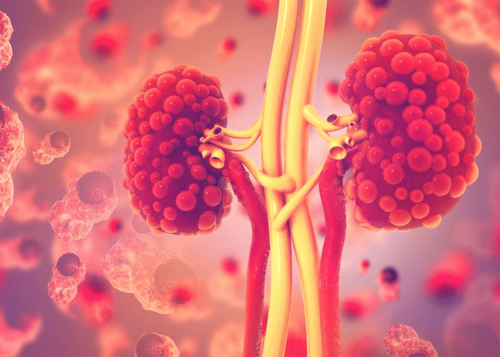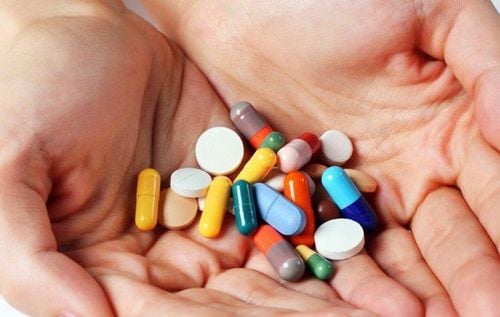This is an automatically translated article.
The article was professionally consulted by Doctor Department of General Surgery and Anesthesia, Vinmec Hai Phong International General Hospital.
The role of urine creatinine helps to accurately assess the degree of kidney failure or assess whether the kidneys are working well or not. Urinary creatinine and serum creatinine are important in kidney diseases.
1. What is the Creatinine Index?
Creatinine is one of the waste products in the body's blood, they are filtered by the kidneys and eliminated from the body in the urine. So it is certain that the creatinine level has something to do with kidney failure.
Creatin is one of the elements that play an important role in the production of energy for the muscles to work, when the creatine is degraded in the muscles, it will form creatinine and be filtered through the glomeruli and when they are not The body's reabsorption in the renal tubules will accurately reflect the filtering function of the kidneys.
Creatinin in our body is of exogenous origin provided by food and is of endogenous origin from synthesis of liver. A large portion of creatinine is maintained in the muscles.
This is considered a product of the breakdown of creatine in the muscles and is eliminated by the kidneys and the creatinine index is considered an accurate indicator of kidney function. The process of testing to get the value of creatinine is for the doctor to diagnose the condition of kidney failure.
Creatinine clearance tests compare the creatinine in a urine sample with the level of creatinine in your blood. This test is used to calculate the volume of blood that is cleared of creatinine in a unit of time.
2. The role of urine creatinine quantification

With creatinine in urine: The doctor will measure the level of creatinine in the urine and analyze the urine sample taken only once in the previous 24 hours. Test results can be wrong if the urine sample is not collected correctly. A urine creatinine test will accurately assess the extent of kidney failure. Creatinine is a chemical waste product that is normally filtered and eliminated by the kidneys. When kidney function has problems, the amount of creatinine will accumulate in the body. A urine creatinine test assesses how well the kidneys are working. A 24-hour urine creatinine test is usually indicated. Since 24-hour urine volume helps to assess diuresis, it is not relevant to the assessment of health risk. If the creatinine in the body is high, it can be a sign of kidney disease. Creatinine is a waste product produced by muscle metabolism. When the kidneys are functioning properly, they help filter and remove other waste products from the blood. These waste products are eliminated from the body through urine excretion. Clinicians can use random urine samples to assess creatinine. Albumin/creatinine ratio (ACR_urine albumin to creatinine ratio)
The albumin/creatinine ratio is considered microalbuminuria, which helps identify kidney disease that may be caused by diabetes. If kidney disease is diagnosed early in a patient with diabetes, treatment is appropriate and monitoring is close. Therefore, ACR rates should be checked soon after the diagnosis of diabetes is confirmed, should be checked regularly, and these rates should be monitored if they are significantly increased. A slight increase in ACR may indicate early kidney disease. A very high ACR level indicates severe kidney disease. A very low ACR value indicates normal kidney function. If diabetes is well managed, complications can be easily controlled. Results are measured in mg of protein excreted in the urine 24 hours. Interpretation results are as follows: If < 30 mg protein: Normal; If ≥ 30 - 300 mg protein: Microalbuminuria and may indicate early kidney disease; If > 300 mg protein: Macroalbuminuria and indicates advanced kidney disease. In addition, the ACR ratio is considered a test that detects small amounts of albumin in the urine. Protein and microalbuminuria are two markers associated with advanced kidney disease, as well as cardiovascular risk factors and mortality.
3. 24h urine test results

Reference value:
Male: 9.0 – 21.0 mmol/24 hours Female: 7.0 – 14.0 mmol/24 hours. Urine creatinine increases in the following cases:
Hyperthyroidism, diseases of the muscles... Diabetes with poor nutrition Menstruation, pregnancy, postpartum. Urine creatinine decreased in the following cases:
Hyperthyroidism Anemia Muscular dystrophy, decreased muscle mass Severe kidney disease Leukemia disease Vegetarian diet Renal failure. Vinmec International General Hospital is one of the hospitals that not only ensures professional quality with a team of leading doctors, modern equipment and technology, but also stands out for its examination and consulting services. and comprehensive, professional medical treatment; civilized, polite, safe and sterile medical examination and treatment space. Customers when choosing to perform tests here can be completely assured of the accuracy of test results.
Customers can directly go to Vinmec Health system nationwide to visit or contact the hotline here for support.
MORE:
What is Creatinine Quantitative? The role of blood creatinine quantification Meaning of tests to evaluate kidney function













